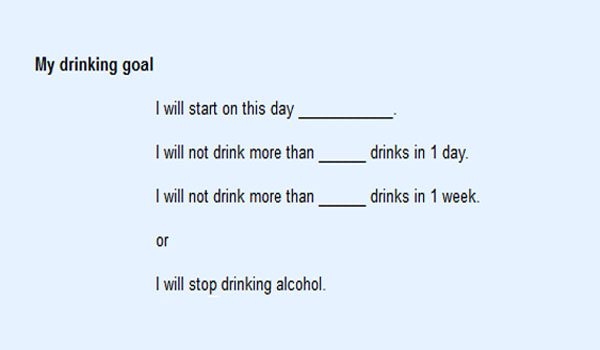Health Pages
How to Cut Down on Your Drinking
How to Cut Down on Your Drinking
If you are drinking too much, you can improve your life and health by cutting down. How do you know if you drink too much? Read these questions and answer "yes" or "no":
 Do you drink alone when you feel angry or sad?
Do you drink alone when you feel angry or sad?
 Does your drinking ever make you late for work?
Does your drinking ever make you late for work?
 Does your drinking worry your family?
Does your drinking worry your family?
 Do you ever drink after telling yourself you won't?
Do you ever drink after telling yourself you won't?
 Do you ever forget what you did while you were drinking?
Do you ever forget what you did while you were drinking?
 Do you get headaches or have a hang-over after you have been drinking?
Do you get headaches or have a hang-over after you have been drinking?
If you answered "yes" to any of these questions, you may have a drinking problem. Check with your doctor to be sure. Your doctor will be able to tell you whether you should cut down or abstain. If you are alcoholic or have other medical problems, you should not just cut down on your drinking--you should stop drinking completely. Your doctor will advise you about what is right for you. If your doctor tells you to cut down on your drinking, these steps can help you:
1. Write your reasons for cutting down or stopping.
Why do you want to drink less? There are many reasons why you may want to cut down or stop drinking. You may want to improve your health, sleep better, or get along better with your family or friends. Make a list of the reasons you want to drink less.
2. Set a drinking goal.
Choose a limit for how much you will drink. You may choose to cut down or not to drink at all. If you are cutting down, keep below these limits:
Women: No more than one drink a day
Men: No more than two drinks a day
A drink is:
 a 12-ounce bottle of beer;
a 12-ounce bottle of beer;
 a 5-ounce glass of wine; or
a 5-ounce glass of wine; or
 a 1½-ounce shot of liquor.
a 1½-ounce shot of liquor.
These limits may be too high for some people who have certain medical problems or who are older. Talk with your doctor about the limit that is right for you.
Now--write your drinking goal on a piece of paper. Put it where you can see it, such as on your refrigerator or bathroom mirror. Your paper might look like this:
3. Keep a "diary" of your drinking.
To help you reach your goal, keep a drinking diary of your drinking. For example, write down every time you have a drink for 1 week. Try to keep your diary for 3 or 4 weeks. This will show you how much you drink and when. You may be surprised. How different is your goal from the amount you drink now? Use the drinking diary provided to write down when you drink.
Now you know why you want to drink less and you have a goal. There are many ways you can help yourself to cut down.
Try these tips:
1. Watch it at home.
2. Keep a small amount or no alcohol at home.
3. Don't keep temptations around.
4. When you drink, drink slowly or sip your drink slowly.
5. Do not drink on an empty stomach!
6. Take a break of 1 hour between drinks.
7. Drink soda, water, or juice after a drink with alcohol.
8. Eat food when you are drinking.
9. Brush your teeth about 20 minutes after drinking.
10. Take a break from alcohol.
Pick a day or two each week when you will not drink at all.
Then, try to stop drinking for 1 week. Think about how you feel physically and emotionally on these days. When you succeed and feel better, you may find it easier to cut down for good.
Learn how to say NO.
You do not have to drink when other people drink. You do not have to take a drink that is given to you. Practice ways to say no politely. For example, you can tell people you feel better when you drink less. Stay away from people who give you a hard time about not drinking.
Stay active.
What would you like to do instead of drinking? Use the time and money spent on drinking to do something fun with your family or friends. Go out to eat, see a movie, or play sports or a game.
Get support.
Cutting down on your drinking may be difficult at times. Ask your family and friends for support to help you reach your goal. Talk to your doctor if you are having trouble cutting down. Get the help you need to reach your goal.
Watch out for temptations.
Watch out for people, places, or times that make you drink, even if you do not want to. Stay away from people who drink a lot or bars where you used to go. Plan ahead of time what you will do to avoid drinking when you are tempted. Do not drink when you are angry or upset or have a bad day. These are habits you need to break if you want to drink less.
DO NOT GIVE UP!
Most people do not cut down or give up drinking all at once. Just like a diet, it is not easy to change. That is okay. If you do not reach your goal the first time, try again. Remember, get support from people who care about you and want to help. Do not give up!
Learn more:



